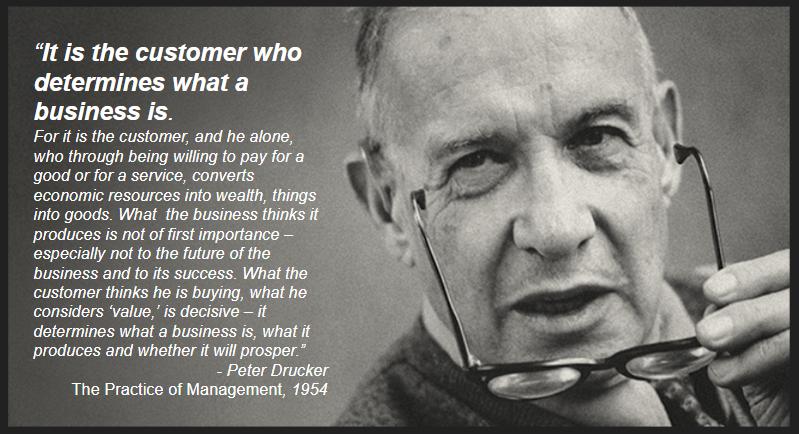I recently posted on LinkedIn some thoughts on Peter Drucker’s famous statement, “There is only one valid purpose of a corporation: to create a customer.” My beliefs in customer sovereignty (meaning that customers have the freedom to take their business wherever they want) and in customers experiencing value from your offerings as the ultimate indicator of future success, led me leave an excellent job, company, and colleagues to start my own business. But it takes constant effort to keep focused on adhering to those beliefs, just as it takes constant effort to keep a company focused on its customers.
“There is only one valid purpose of a corporation: to create a customer.”
Peter Drucker
This was inspired by coming across this post, Why Peter Drucker Got Customer Value Right, while searching for some expanded context and comment on Peter Drucker’s statement, “There is only one valid purpose of a corporation: to create a customer.” In that post, Steve Denning reaffirmed his thesis that “stakeholder capitalism” is the “second dumbest idea in the world” (also reaffirming Jack Welch’s assessment of “shareholder value” as “the world’s dumbest idea”). The post wasn’t exactly what I was looking for, but it was so much more valuable: it got me thinking.

That process and effort of thinking got me to articulate in a new way, and maybe a better one, why I founded Simbiotrek (sim-bē-ä-‘trek): To work for a company that focuses exclusively on customer value—and works exclusively with clients who want to do the same, even if they don’t quite know how to do it from where they are.
I find that not everyone who agrees with the importance of being customer-centered, is ready to carry that idea to (what seems to me) its logical conclusion:
All action and strategy in a business must be directed to enabling customers to experience value.
Me
And that all starts by creating the customer in the first place, so all action and strategy must be measured by their contributions to to that end.
It is tempting, and easy, to add other purposes into the mission; “the environment”, “social good”, and even “employee health and happiness”. Not that these are not good pursuits, or that they are things that no business should not do. But unless they are done in service of “enabling customers to experience value”, they should be left to the individual human action of the company’s members and employees. Indeed, as a newly independent entrepreneur, reflecting on the article made me realize that I had been imbuing Simbiotrek with some of my own purposes, which may not strictly align with “the only valid purpose of a corporation”. Again, I should pursue these goals in my life, but I should also limit their pursuit through my business to the cases where they are in service of customer value.
Reading something that makes you think and reconsider your actions and ways of operating is always valuable, even if you end up changing nothing. I find that Peter Drucker and Steve Denning are good authors for me to come back to from time-to-time to remind me of the reasons for the vision that I have for my professional life and for Simbiotrek. So here’s one last great quote for me to “come back to” whenever I look at this blog again:
“It is the customer who determines what a business is.”
Peter Drucker
